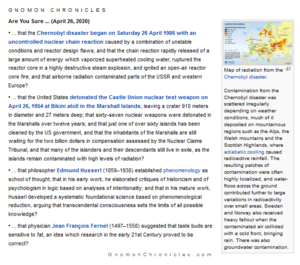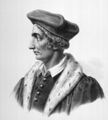April 26: Difference between revisions
(Created page with "{{Selected anniversaries/April 26}}") |
No edit summary |
||
| Line 1: | Line 1: | ||
'''Are You Sure ... (April 26)''' | |||
{{Are_You_Sure/April_26}} | |||
<br style="clear:both"> | |||
[[File:Are You Sure (April 26, 2020).png|thumb|left|Screenshot: Are You Sure (April 26, 2020)]] | |||
<br style="clear:both"> | |||
'''On This Day in History and Fiction''' | |||
{{Selected anniversaries/April 26}} | {{Selected anniversaries/April 26}} | ||
Revision as of 18:34, 26 April 2020
Are You Sure ... (April 26)
• ... that physicist Owen Willans Richardson won the Nobel Prize in Physics in 1928 for his work on thermionic emission, which led to Richardson's law, and that Richardson also researched the photoelectric effect, the gyromagnetic effect, the emission of electrons by chemical reactions, soft X-rays, and the spectrum of hydrogen?
• ... that the Chernobyl disaster began on Saturday 26 April 1986 with an uncontrolled nuclear chain reaction caused by a combination of unstable conditions and reactor design flaws; and that the chain reaction rapidly released of a large amount of energy which vaporized superheated cooling water, ruptured the reactor core in a highly destructive steam explosion, and ignited an open-air reactor core fire; and that airborne radiation contaminated parts of the USSR and western Europe?
• ... that the United States detonated the Castle Union nuclear test weapon on April 26, 1954 at Bikini atoll in the Marshall Islands, leaving a crater 910 meters in diameter and 27 meters deep; that sixty-seven nuclear weapons were detonated in the Marshalls over twelve years; and that just one of over sixty islands has been cleaned by the US government, and that the inhabitants of the Marshalls are still waiting for the two billion dollars in compensation assessed by the Nuclear Claims Tribunal, and that many of the islanders and their descendants still live in exile, as the islands remain contaminated with high levels of radiation?
• ... that physician Jean François Fernel (1497–1558) suggested that taste buds are sensitive to fat, an idea which research in the early 21st Century proved to be correct?
On This Day in History and Fiction
1558: Physician Jean Fernel dies. Fernel ntroduced the term "physiology" to describe the study of the body's function, and was the first person to describe the spinal canal.
1879: Printer, bookseller, and inventor Édouard-Léon Scott de Martinville dies. He invented the phonoautograph, which records an audio signal as a photographic image.
1879: Physicist and academic Owen Willans Richardson born. He will win the 1928 Nobel Prize in Physics for his work on thermionic emission, which led to Richardson's law.
1954: Castle Union nuclear weapons test at Bikini Atoll: the United States detonates the TX-14 thermonuclear weapon, one of the first deployed U.S. thermonuclear bombs. The explosion causes extensive fallout. Castle Union was the code name given to one of the tests in the Operation Castle series of United States nuclear tests. It was the first test of the TX-14 thermonuclear weapon (initially the "emergency capability" EC-14), one of the first deployed U.S. thermonuclear bombs. Pic.
1986: A nuclear reactor accident occurs at the Chernobyl Nuclear Power Plant in the Soviet Union (now Ukraine).





